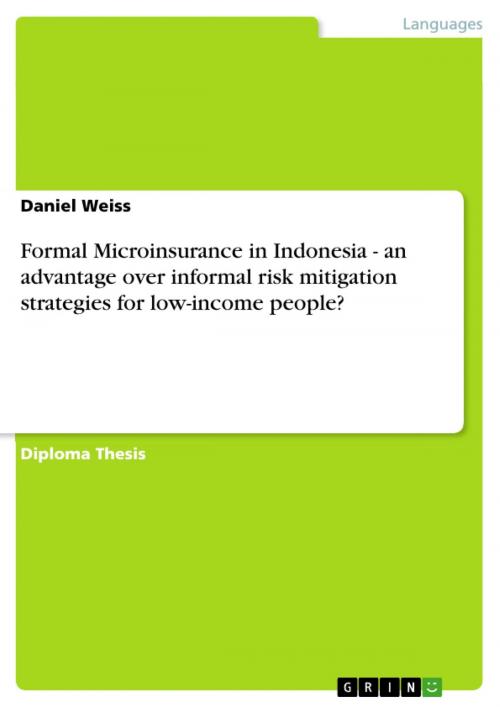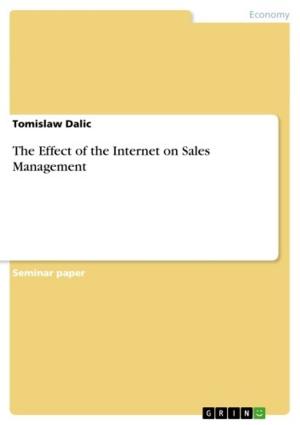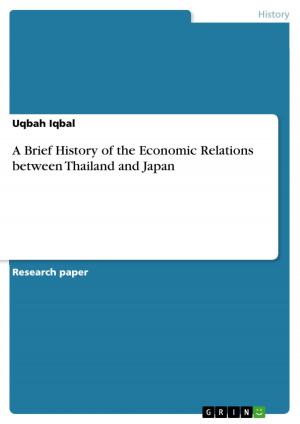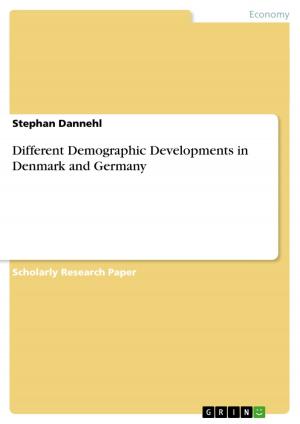Formal Microinsurance in Indonesia - an advantage over informal risk mitigation strategies for low-income people?
an advantage over informal risk mitigation strategies for low-income people?
Nonfiction, Social & Cultural Studies, Social Science, Cultural Studies, Ethnic Studies| Author: | Daniel Weiss | ISBN: | 9783638528412 |
| Publisher: | GRIN Publishing | Publication: | July 30, 2006 |
| Imprint: | GRIN Publishing | Language: | English |
| Author: | Daniel Weiss |
| ISBN: | 9783638528412 |
| Publisher: | GRIN Publishing |
| Publication: | July 30, 2006 |
| Imprint: | GRIN Publishing |
| Language: | English |
Diploma Thesis from the year 2006 in the subject South Asian Studies, South-Eastern Asian Studies, grade: 1,7, University of Passau, 55 entries in the bibliography, language: English, abstract: Around 52.4% of Indonesia's 242 Mio. inhabitants have to live and struggle with an income - respectively a purchasing power parity - of less than two dollar per day. All people who live on less below this international benchmark - set by the World Bank - are considered as poor. The poor who dispose of only one dollar a day are considered the extreme or very poor whereas those who have a daily income between one and two dollars are considered as the moderate poor. Both groups are referred to in this work as the poor or low-income households. These low-income households in Indonesia face disadvantages as they are highly vulnerable to risk events such as health or property risks. The concept of vulnerability describes the poor people's inability to deal with losses which result from the occurrence of an adverse event, e.g. illness or disability and is based on two perceptions. Poor people are most exposed to hazards as they often live and work in a perilous environment. In addition, the poor are the group in society least capable of dealing with losses after the occurrence of risk events. In Indonesia at least 'two fifth of the population near the poverty line are ...highly vulnerable to even modest shocks to the economy'. Thus, the economic situation of low-income households is intricate in two ways: 'Poor households throughout the world face twin disadvantages. The first is difficulty in generating income, while the second is vulnerability to economic, political and physical downturns. Harder still, the two disadvantages reinforce each other; poverty is a source of vulnerability and repeated exposure to downturns reinforces poverty.' Besides vulnerability the economic situation of low-income households in Indonesia forms a barrier for the use of financial services in general. As low-income households face difficulties in generating regular incomes they only dispose of small funds that can be used as savings, credit collateral or insurance premium. The poor seem to be too poor to afford the premiums for commercial insurance products because these products are designed for the middle and upper-class market segments. As the poor are not able to purchase commercial insurance products they have to have to use alternative measures for dealing with their risks. [...]
Diploma Thesis from the year 2006 in the subject South Asian Studies, South-Eastern Asian Studies, grade: 1,7, University of Passau, 55 entries in the bibliography, language: English, abstract: Around 52.4% of Indonesia's 242 Mio. inhabitants have to live and struggle with an income - respectively a purchasing power parity - of less than two dollar per day. All people who live on less below this international benchmark - set by the World Bank - are considered as poor. The poor who dispose of only one dollar a day are considered the extreme or very poor whereas those who have a daily income between one and two dollars are considered as the moderate poor. Both groups are referred to in this work as the poor or low-income households. These low-income households in Indonesia face disadvantages as they are highly vulnerable to risk events such as health or property risks. The concept of vulnerability describes the poor people's inability to deal with losses which result from the occurrence of an adverse event, e.g. illness or disability and is based on two perceptions. Poor people are most exposed to hazards as they often live and work in a perilous environment. In addition, the poor are the group in society least capable of dealing with losses after the occurrence of risk events. In Indonesia at least 'two fifth of the population near the poverty line are ...highly vulnerable to even modest shocks to the economy'. Thus, the economic situation of low-income households is intricate in two ways: 'Poor households throughout the world face twin disadvantages. The first is difficulty in generating income, while the second is vulnerability to economic, political and physical downturns. Harder still, the two disadvantages reinforce each other; poverty is a source of vulnerability and repeated exposure to downturns reinforces poverty.' Besides vulnerability the economic situation of low-income households in Indonesia forms a barrier for the use of financial services in general. As low-income households face difficulties in generating regular incomes they only dispose of small funds that can be used as savings, credit collateral or insurance premium. The poor seem to be too poor to afford the premiums for commercial insurance products because these products are designed for the middle and upper-class market segments. As the poor are not able to purchase commercial insurance products they have to have to use alternative measures for dealing with their risks. [...]















